Table of Contents
ToggleHigh Cholesterol and Thyroid Issues
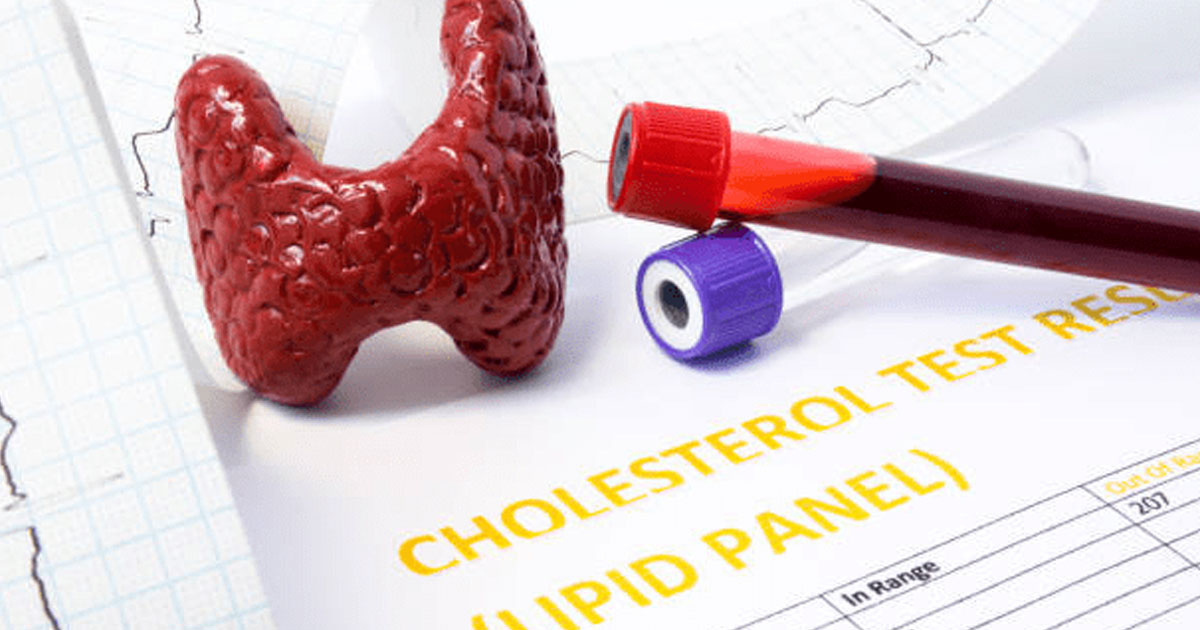
Moreover , high TSH levels may directly increase cholesterol concentrations even if thyroid hormonal concentrations are not low.Cholesterol is affected in the opposite way by hyperthyroidism. It lowers cholesterol levels to unusually low levels.
What Exactly is High Cholesterol?


Lipoproteins are particles that aid in the transport of cholesterol through the circulation. Lipoproteins are classified into two types.
Low-density lipoprotein (LDL), commonly known as “bad cholesterol,” may accumulate inside the arteries and cause severe health issues such as a heart attack as well as stroke.
High-density lipoprotein (HDL), often known as “good cholesterol,” aids in the return of LDL cholesterol towards the liver for disposal.
These plaques will obstruct the flow of blood via your arteries. This may create issues across your body, especially in your heart or brain, or it might be deadly.
Why is High Cholesterol Dangerous?
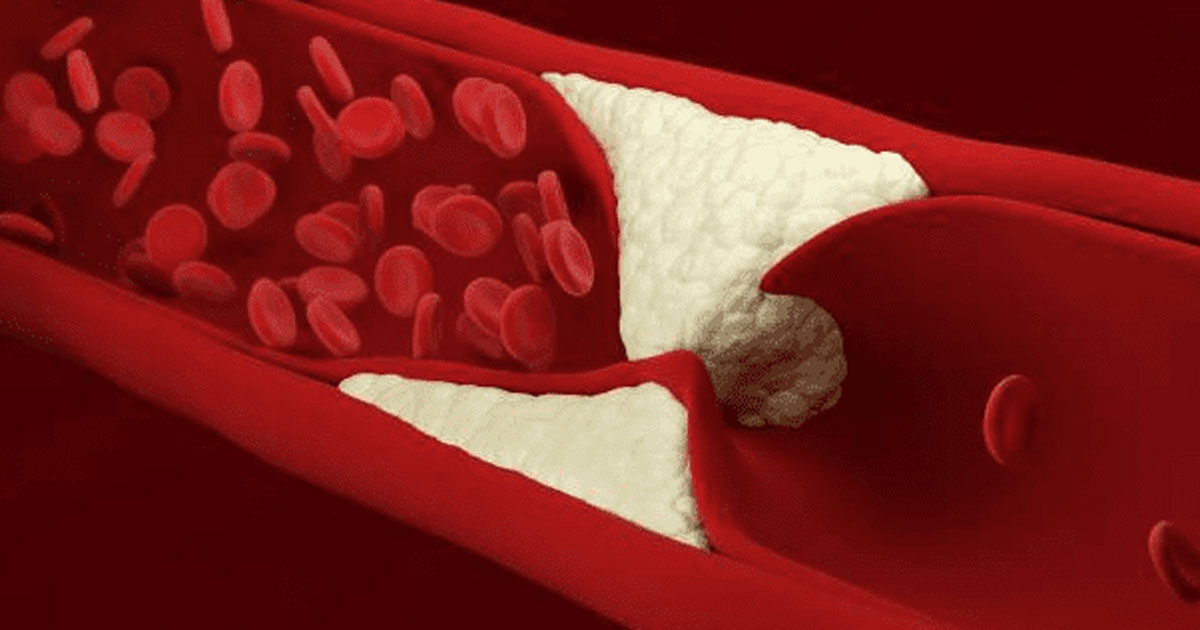
The Link between Thyroid and Cholesterol

Quite often the thyroid produces too few or too many hormones. Hypothyroidism is a condition wherein your thyroid gland is underactive. Whenever the thyroid gland is underactive, your entire body feels sluggish. You feel exhausted, lethargic, chilly, and achy.
Hyperthyroidism is a disorder in which the thyroid is hyperactive. Whenever your thyroid is hyperactive, your body goes into overdrive. Your heart rate quickens, and you get anxious and unsteady.
Your thyroid gland is a small gland in the neck. It generates hormones that aid in the regulation of your metabolism. If you get hypothyroidism, your body makes insufficient thyroid hormones. This has the potential to raise your cholesterol levels. In fact, studies show that even somewhat low concentrations of thyroid hormones may induce a rise in cholesterol.
Drops in oestrogen are linked with an increase in total cholesterol concentrations owing to increased levels of low density lipoprotein (LDL), or the “bad” cholesterol, including triglyceride, yet another blood lipid (fat).
Moreover, inflammation in the body especially in people having thyroid issues can have effects on the cardiac health of people.
Thyroid Medicine Increases your Cholesterol !

Is your Elevated Cholesterol a Sign of Anything Serious?

Usually, elevated cholesterol does not produce any symptoms. In most instances, it only results in emergency situations. A cardiac arrest or stroke, for example, may occur from the destruction caused by excessive cholesterol.
These episodes usually do not occur until excessive cholesterol causes plaque to develop in your arteries. Plaque may constrict arteries, allowing less blood to flow through. Plaque development alters the composition of your artery lining. This may have severe consequences.
Countless studies have found that high cholesterol is a significant risk factor for coronary artery disease including myocardial infarction (MI).
We understand that plasma cholesterol concentrations rise over age, as does the risk of coronary heart disease. The process behind age-related hypercholesterolemia remains poorly understood.
The worldwide team of specialists has discovered that elderly individuals with high concentrations of low-density lipoprotein (LDL-C) survive as long, and even longer, than their counterparts with low concentrations of LDL-C.
Following an analysis of previous studies that included more than 68,000 people involved over the age of 60, researchers have called into query the ‘cholesterol hypothesis,’ which holds that people who have high cholesterol are always at risk of death and therefore require statin drugs to decrease their cholesterol.
Symptoms of High Cholesterol

A high amount of blood cholesterol has no apparent symptoms, but it may raise your chances for diseases that do show symptoms, such as angina (chest discomfort associated with heart problems), increased blood pressure, strokes, and other circulation problems. Also:
- Smooth, yellowish growths or lesions upon the skin called xanthomas could also indicate increased cholesterol concentrations.
- Many individuals who are overweight or diabetic have higher cholesterol.
- Impotence in males may be produced by arteries clogged by high levels of blood cholesterol.
The quantity of cholesterol within your food and the quantity of cholesterol in the blood are two completely distinct quantities.
While it may seem obvious that consuming cholesterol would result in an increase in blood cholesterol concentrations, this is not always the case.
When you reduce your food consumption of cholesterol, your body produces extra. When you consume more cholesterol, your body produces less. As a result, meals rich in dietary cholesterol exert a little effect on the blood cholesterol levels of the majority of individuals.
How to know if you have High Cholesterol. Tests and Diagnosis

Consult your doctor when you experience thyroid symptoms and your cholesterol readings are high or low.
Blood tests will be performed to determine your TSH concentration as well as the amount of thyroxine, a thyroid hormone. These tests would assist your doctor in determining if your thyroid is hyperactive or you have hypothyroidism.
Thyroid disorders may have a significant impact on the lipid profile. Thyroid problems should be identified and treated.

Only a blood test can tell you whether your cholesterol levels are too high. This entails maintaining a total cholesterol concentration in the blood that is more than 240 milligrammes per deciliter (mg/dL).
Request a cholesterol test from your doctor once you reach the age of 20. Furthermore, every 4 to 6 years, have your cholesterol tested again.
If you share a family background of high cholesterol, your doctor might advise you to get your cholesterol levels tested more often. Additionally, if you exhibit any of the below risk factors:
- suffer from high blood pressure;
- are overweight
- or smoke
High cholesterol is easily diagnosed using a blood test known as a lipid panel. Your physician will draw a blood sample and submit it over to a lab for examination. Your doctor will instruct you to refrain from eating or drinking for at least 12 hours before the testing.
Total cholesterol, HDL cholesterol, LDL cholesterol, and triglycerides are all measured in a lipid panel. The following are the ideal levels:
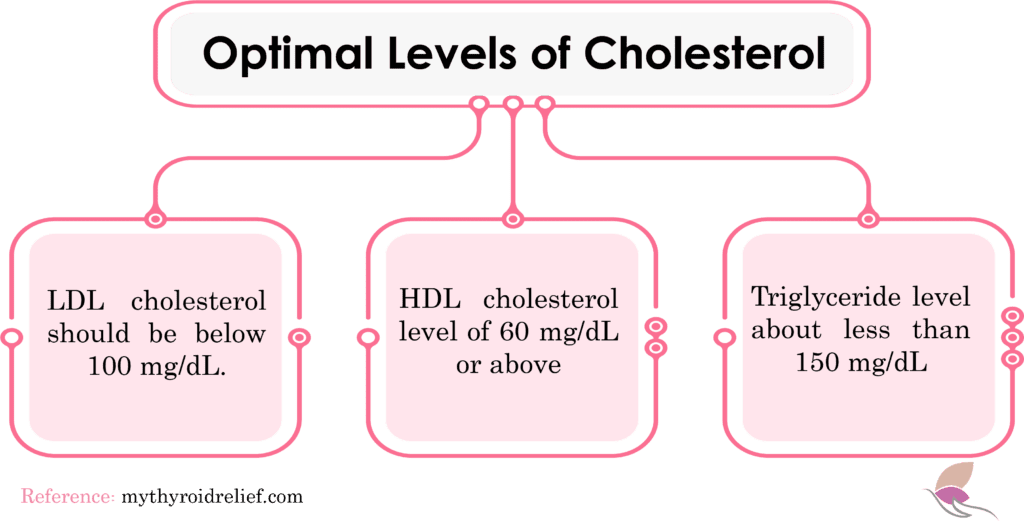
- LDL cholesterol should be below 100 mg/dL.
- HDL cholesterol level of 60 mg/dL or above
- Triglyceride level about less than 150 mg/dL
If your total cholesterol level is between 200 and 239 mg/dL, it is termed “borderline high.” It is termed “high” if it is more than 240 mg/dL, and it is labeled “borderline high” if it is within 130 and 159 mg/dL. If it is more than 160 mg/dL, it is termed “high.”
If your HDL cholesterol level is less than 40 mg/dL, you are deemed to have “poor” HDL cholesterol.
Because high cholesterol levels may not often produce symptoms, particularly at first, it is essential to be checked. You may be thin and healthy while yet having a cholesterol issue. Once you’ve identified an issue, you may attempt to address it via diet, lifestyle changes, and, if required, medication.
But you’re unable to do so if you’re unaware of it. If you are 20 or above, you need to get your levels tested every 4 to 6 years (through a simple blood test). If you are overweight, have diabetes, or have heart problems, your doctor must test you more frequently.
Is it likely that conventional healthcare was completely incorrect about cholesterol? Do you believe that, in addition to the fact that cholesterol has no relation to heart disease, high cholesterol is really a positive thing?
If you ask me, it would be more than plausible – in this part, I’ll present to you some proof showing having higher cholesterol is linked with living longer.
According to population studies conducted in Japan, individuals of all ages who have greater cholesterol live longer lives.
There may be a variety of factors at play. Anti-infection and anti-atherosclerosis properties of cholesterol have been demonstrated. Cholesterol has been shown to be protective against cancer. Low cholesterol was shown to have a significant relationship with aggression in one study.
In a number of studies, it has been shown that low cholesterol is associated with suicide. For example, one research discovered that individuals in the bottom quartile (fourth) of total cholesterol had a much more risk of suicide compared to those in the upper quartile of total cholesterol.
A series of researches have shown that having high cholesterol is linked with a reduced mortality rate, at least in individuals older than 60 years old.
There is a tidal wave of disinformation per each drop of scientific proof that statins are free from side effects. Statins are indeed the “gold standard” in the management of hypercholesterolemia.
They are a potent medicine that has been shown to save the lives of numerous men and women who suffer from or are at significant risk of stroke or heart attack. However, if statins are always so beneficial, why are some individuals fearful about taking them?
As with any medicine, statins have their own drawbacks. Muscle soreness is a frequent complaint among statin users. This discomfort may manifest as muscular soreness, fatigue, or weakness.
The pain may be moderate or serious enough to make everyday tasks difficult. At times, statin usage may result in a rise in the concentration of enzymes associated with liver inflammation.
When you use a statin, it is conceivable that your blood glucose level may rise, which may result in the development of type 2 diabetes. The risk is minimal but significant enough as the Food and Drug Administration (FDA) recently mandated statin labels to include a warning about blood sugar levels and diabetes.
On statin warning labels, the FDA cautions that some individuals may experience memory loss or disorientation when taking statins. These adverse effects will subside after the drug is discontinued.
Although there is little evidence to establish a cause-and-effect connection, see your physician if you suffer memory loss or disorientation while taking statins.
How Can You Treat High Cholesterol Levels?
“Your cholesterol” is indeed a collection of numbers that, when added together, provide your doctor with a “lipid profile.” Unhealthy concentrations have been related to artery hardening, which may lead to heart problems, cardiac arrest, and stroke.
Triglycerides as well as “bad” (LDL) and “good” (HDL) cholesterol are among your numbers. Using this information and the advice and direction of your physician, you may begin to understand and control your own numbers.
The great news is that managing thyroid dysfunction may help you lower your cholesterol. Thyroid hormone replacement medicines are used to treat hypothyroidism. Hypothyroidism cannot be cured.
That is why lowering your cholesterol does not raise your thyroid hormone concentrations. Individuals with elevated cholesterol levels should be checked for an underactive thyroid, according to experts.
Your doctor would check your cholesterol numbers if you are getting treatment for an underactive thyroid. A few hypothyroid patients may not be able to reduce their cholesterol concentrations enough using thyroid replacement hormones.
If this occurs to you, your doctor may advise you to take further steps, such as eating better, exercising frequently, and considering a cholesterol-lowering prescription.
We need to look for the roots of these problems: Low levels of thyroid hormones in hypothyroidism, low levels of testosterone, high levels of estrogens, high levels of cortisol, low DHEA, problems with the liver etc.
No physical activity and bad diet(pesticides, chemicals etc).“Your cholesterol” is indeed a collection of numbers that, when added together, provide your doctor with a “lipid profile.”
Unhealthy concentrations have been related to artery hardening, which may lead to heart problems, cardiac arrest, and stroke. Triglycerides as well as “bad” (LDL) and “good” (HDL) cholesterol are among your numbers.
Using this information and the advice and direction of your physician, you may begin to understand and control your own numbers. The great news is that managing thyroid dysfunction may help you lower your cholesterol.
Thyroid hormone replacement medicines are used to treat hypothyroidism. Hypothyroidism cannot be cured. That is why lowering your cholesterol does not raise your thyroid hormone concentrations.
Individuals with elevated cholesterol levels should be checked for an underactive thyroid, according to experts. Your doctor would check your cholesterol numbers if you are getting treatment for an underactive thyroid.
A few hypothyroid patients may not be able to reduce their cholesterol concentrations enough using thyroid replacement hormones.
If this occurs to you, your doctor may advise you to take further steps, such as eating better, exercising frequently, and considering a cholesterol-lowering prescription.
We need to look for the roots of these problems: Low levels of thyroid hormones in hypothyroidism, low levels of testosterone, high levels of estrogens, high levels of cortisol, low DHEA, problems with the liver etc. No physical activity and bad diet(pesticides, chemicals etc).
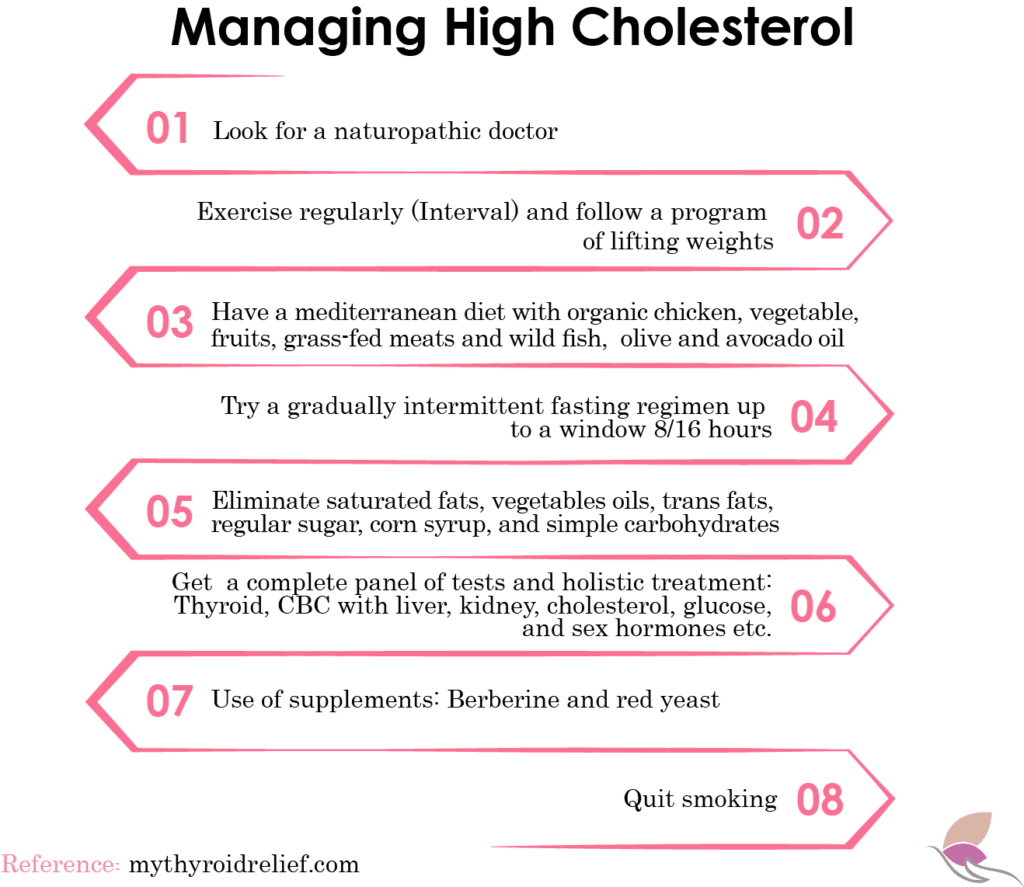
Exercise Regularly

Regular physical activity is one of the most effective methods to manage your cholesterol. You are not required to run marathons. Three or four times per week, nearly 30 minutes of vigorous walk, swim, or dance should suffice.
If you’re pressed for time, you may do it in 10-minute intervals during the day. Resistance exercise (pushups, pullups, weights) might be beneficial.
Interval training, particularly HIIT (high-intensity interval training), is quite famous at the present due to its efficiency in terms of general health and fat loss. Additionally, it works wonders for decreasing obstinate fat deposits in troubled regions like the belly and legs!
If you have a thyroid or adrenal disorder, HIIT might be too hard for you in the beginning. However, almost everyone may benefit from interval training, at even a lesser intensity.
If HIIT is far too intense for you, seek for exercises that include MIIT (medium-intensity interval training) or even LIIT (low-intensity interval training). Simply remember to begin slowly and work your way up.
Quit Smoking
Smoking decreases good cholesterol, causing you to retain more of bad stuff, Low-density lipoprotein. It has also been related to hypertension, diabetes, as well as heart disease. If you stop smoking, your cholesterol levels will improve and your vessels will be protected. Even if you don’t smoke, it’s a good idea to avoid passive smoking.
Achieve a Healthy Weight

You may observe an “apple shape” as you grow bigger in your center than in other places. However, if you drop only 10% of your body weight, you may significantly improve your statistics, potentially lining them up to healthy levels. Consult your doctor regarding the best diets and exercise plan for you to lose weight.
Intermittent fasting has gained popularity recently due to the potential for numerous health advantages.
Intermittent fasting (IF) occurs when an individual’s eating and fasting patterns are cyclical. In contrast to diets that limit specific foods, intermittent fasting is an eating strategy focused on the time among meals. Individuals may follow a variety of different patterns for intermittent fasting.

Reduce saturated fat: Saturated fat, which is found in beef, pig, lamb, including full-fat dairy products such as butter, creams, milk, cheese, and yogurt, and also hydrogenated tropical oils. All of these things may increase your LDL or “bad” cholesterol.
Trimming visible fat off or lean cuts of meats and looking for low-fat milk as well as low-fat yogurt from grass-fed and organic sources may all help. If your LDL is elevated. Trans fats should also be avoided at all costs.
Treat Underlying Thyroid and other Diseases
There is an option of considering the combination therapy with the guided slow release of T3 and T4 to increase the amount of freeT3 if it’s low or vice versa.
Increased blood levels of both T4 and T3 as well as an elevation in the fT3/fT4 ratio were seen in individuals with hypothyroidism who received combination treatment with Levothyroxine (T4) and Liothyronine (T3).
The combined treatment of LT4 and LT3 may have an effect on many of the thyroid hormone-dependent activities. The combined treatment of LT4 and LT3 may result in lower blood cholesterol levels as well as increased bone resorption activity as a side effect.
The use of LT4 with slow-release LT3 preparations may be beneficial since LT3 seems to have a shorter half-life and is taken into circulation at a quicker rate, resulting in undesirable high serum levels in certain patients. When it comes to optimizing blood thyroid hormone levels, the LT4 with slow-release LT3 combination has shown encouraging effects.
When my thyroid hormones levels for Free T4 and Free T3 went to optimal ranges, my cholesterol didn’t lower enough to reach optimal cholesterol range. I could only say that my number got lower enough not to worry me too much.
My cholesterol levels started to come down significantly when I took Red Yeast and Berberine twice a day before or immediately after my two meals for the day. I also took COQ10 to protect my heart.
Individuals suffering from cardiovascular disease (CVD) could reap substantial benefits from coenzyme Q10, which may include everything from lowering the risk of recurring heart problems and improving health outputs in patients with cardiac failure to regulating blood pressure and combating the negative consequences of cholesterol-lowering statins.
Lifestyle changes to control cholesterol levels

Many of us don’t need to stock our medicine shelves with cholesterol-lowering medications. Holistic, lifestyle-based methods have been shown to be very successful in lowering cholesterol fast and completely.

Inflammation and infection may also affect lipid metabolism in chronic inflammatory disorders, resulting in a reduction in serum HDL cholesterol and an elevation in triglycerides, lipoprotein, or LDL cholesterol levels.
While these alterations in lipid concentrations may temporarily reduce inflammation or aid in the battle against infection, prolonged inflammation can lead to an elevated risk of atherosclerosis.
Inflammation can also induce a variety of alterations in lipid metabolism, including a decrease in HDL cholesterol, increases in triglycerides, and LDL levels. Along with altering blood lipid concentrations, inflammation impairs lipoprotein functioning;
LDL is more susceptible to oxidation, since HDL’s capacity to inhibit LDL oxidation is reduced, and many stages in the reverse lipid transport route are also impaired during inflammation.
The more severe the associated inflammatory illness, the more frequently these lipid and lipoprotein abnormalities are seen. It is possible to have too low a cholesterol level. This is, although, much less frequent than excessive cholesterol.
Decreased cholesterol may also have a role in the development of other medical problems, such as cancer, stress, and anxiety.

Medications like statins should be used as the last resource, along with exercising regularly and a balanced diet, and supplements like berberine with red yeast, omega-3 may help reduce elevated LDL levels.
When your cholesterol levels fall as a result of these factors, there is generally no issue. It is only when your cholesterol levels decrease unexpectedly that you should take attention and see your healthcare practitioner.
While the precise health consequences of low cholesterol are still being researched, experts are worried about why low cholesterol seems to have a detrimental influence on mental health.

According to researchers, since cholesterol is required for the production of hormones including vitamin D, low concentrations may have an effect on your brain’s function.
Vitamin D is required for normal cell development. When your brain cells are not functioning properly, you may feel anxiety or sadness.
Another issue raised by low cholesterol is the possibility of pregnancy in women. If you are pregnant and have insufficient cholesterol, you run a greater risk of preterm delivery or having a kid with a lower birth weight.
Low cholesterol risk factors include a family background of the disease, use of statins or similar blood pressure-lowering medications, and untreated depression.
Many of us can lower your cholesterol naturally and without the use of medicines. It is a false assumption that simple lifestyle measures may be very effective to normalize your cholesterol levels, but it isn’t that simple!
It is complicated. We need to see that our thyroid levels are optimal, that our hormones are balanced or replaced as we age, and we have to cut trans fats, fast food and deep fry foods, eliminate regular sugar, corn syrup, practice fasting and interval exercise.
You can also manage at the same time with some supplements: CoQ10(if you take red yeast), Omega-3, Berberine and red yeast and check for your hormones(testosterone, estrogens, and DHEA levels) beside the thyroid and also the health of the liver(that produce the cholesterol) check for inflammation markers with blood tests like CRP, erythrocyte sedimentation rate (ESR), and plasma viscosity (PV) and healthy diet.
Physicians, nutritionists, holistic experts, and other healthcare practitioners teach the following five essential lifestyle-change strategies for rapid, substantial reduction of cholesterol levels, especially LDL, the bad cholesterol.
Emphasize Fruits, Veggies, Whole Grain Products, and Beans
We do not have to be full vegans to get our cholesterol concentrations into good ranges, however the more leafy greens, low glycemic fruits, sweet potatoes as well as other naturally-fiber-rich plant food products we consume, the healthier and happier we’ll be.
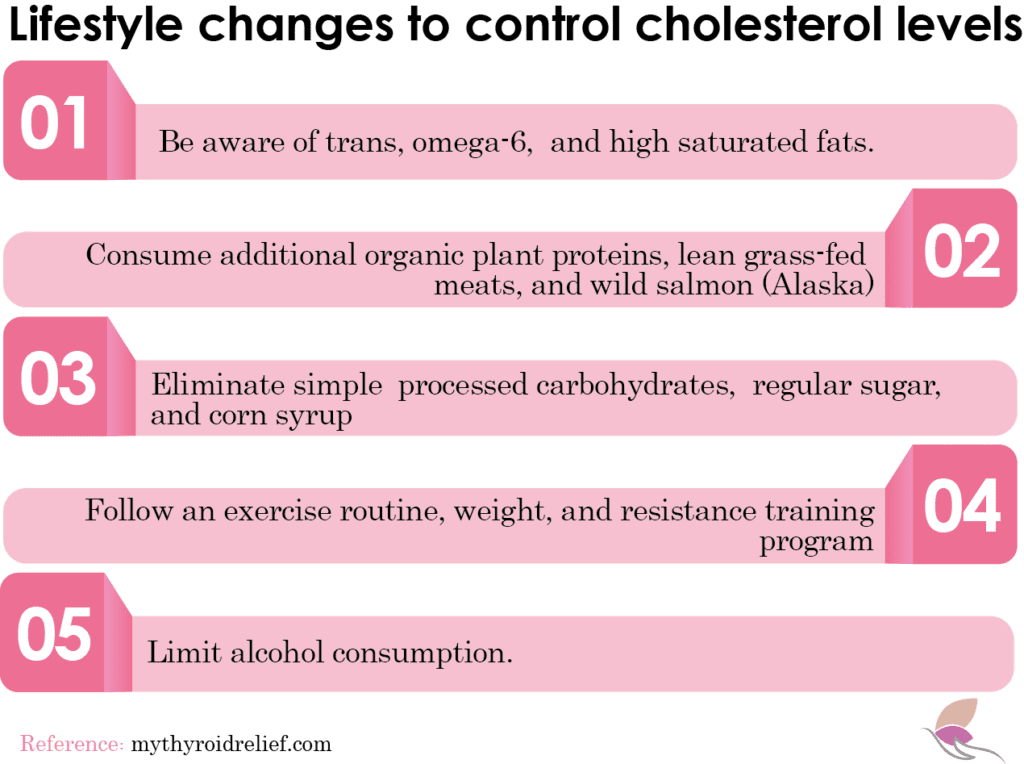
Be Aware of your Fat Consumption
Trans fats are naturally present in the guts of certain animals, and meals derived from such animals (e.g., meat and dairy products) may include trace amounts of these fats.
Manufactured trans fats are produced industrially by adding hydrogen to liquid vegetable oils in order to solidify them.
Trans fats are mostly found in commercial foods in the form of “partially hydrogenated oils.”

Trans fats exist naturally in trace quantities in certain meat and dairy, particularly beef, mutton, and butterfat.
Oils are undoubtedly a difficult subject to manage. When you go into a grocery shop, you are confronted with hundreds of various kinds of oils. How do you determine which are helpful and which are not?
The following oils have a high concentration of pro-inflammatory omega 6 fats and are highly refined and processed. Numerous of them are genetically engineered and hydrogenated (neither of which you want to consume!)
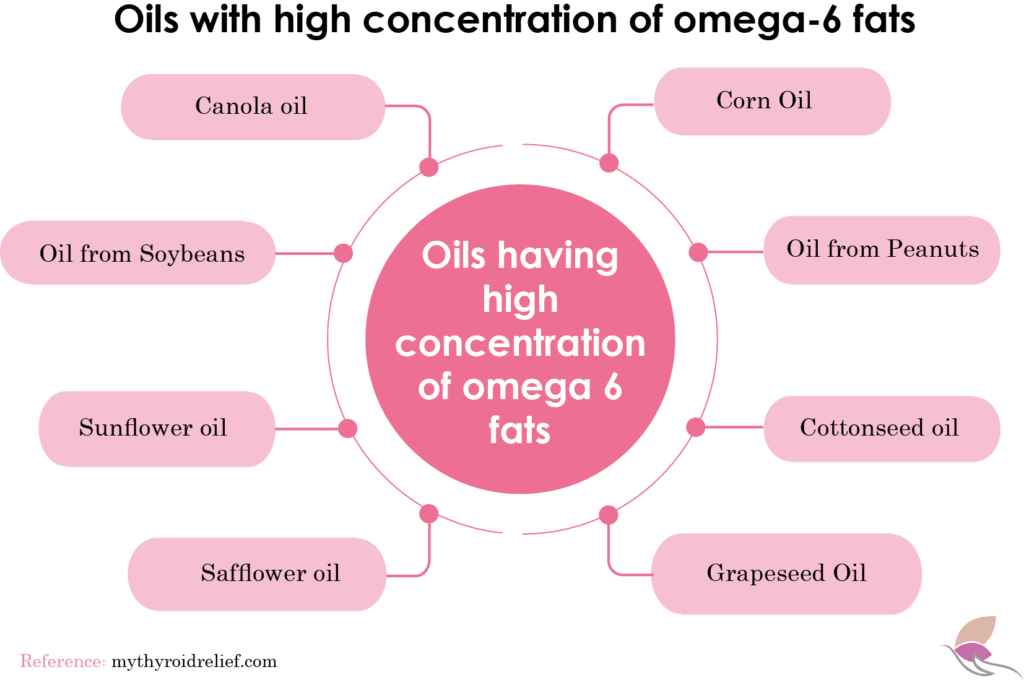
- Canola oil
- Oil from Soybeans
- Sunflower oil
- Safflower oil
- Grapeseed Oil
- Cottonseed oil
- Oil from Peanuts
- Corn Oil
Olive oil, which is strong in monounsaturated fats, has anti-inflammatory properties and is rich in antioxidants, which combat damage caused by free radicals. Olive oil is particularly good as a heart-healthy meal due to its high antioxidant content.

Additionally, it includes medium-chain fatty acids, which allow it to be retained as energy rather than fat by the body. Moreover, it is good in reasonable amounts for cooking and baking purposes, keeping your skin and hair moisturized.
You also can use coconut oil for oral hygiene using the oil pulling practice that involves swishing oil in your mouth to remove bacteria. There is a link between oral bacteria in fatty deposits in people with atherosclerosis.
Avocado oil, which is rich in monounsaturated oleic acids (healthy fats), has been shown to reduce blood pressure, enhance heart health, and boost nutrient absorption (particularly antioxidants) from meals.
Consume Additional Plant Protein
Understand about great plant proteins that, instead of increasing levels of cholesterol like animal protein does, actually assist reduce cholesterol. Examples include plant protein, whey protein, etc.
Consume Less Processed Carbohydrates like White Flour, White Rice
If you’re looking to reduce your cholesterol, the Mediterranean diet is indeed an excellent option. Because it emphasizes plant-based protein sources such as legumes, nuts, and lentils, as well as whole grain, seafood, and fruits and veggies, it is typically rich in fiber, which may assist reduce cholesterol concentrations.
Additionally, it maintains your digestive system working and your stomach full, reducing your chances of feeling hungry during the day. Additionally, the diet is minimal in saturated fat, processed carbohydrates, and sweets, all of which have been shown to increase cholesterol.
Get Active
Discover a simple and effective strategy that is simple to incorporate into everyday life. You can follow a regimen of intermittent exercises to get active and lift weights to keep your muscle mass as you get older.
Around 4 months after taking the red yeast and berberine and my other vitamins and supplements, miraculously my total cholesterol, triglycerides went 100 points down, and my LDL went to normal ranges but my HDL and the good cholesterol stayed at 45(bottom of the normal range)
Sadly, after 4 months of taking the red yeast and Berberine, I started having muscle pain.
I want to explain that Red yeast contains substances called monacolins. Monacolin K is chemically identical to the active ingredient in the cholesterol-lowering drug lovastatin and can cause problems with the muscles, especially if you have the gene that can’t tolerate that drug.
Later, after I got evaluated with a blood test, I found out that I have the gene that caused me muscle problems.
I had to stop taking the red yeast and my cholesterol levels went up again but not too far from the normal levels.
Approximately 15% of patients have the variant SLCO1B1, which reduces the ability of the liver to carry statins out of the blood.
80% of the time I continue eating healthy food with a diet of a low glycemic index, with organic vegetables and berries, green apple and sporadic Greek yogurt, and 75% dark chocolate with monk fruit, grass-fed lean meats, and wild salmon from Alaska to get additional Omega 3 to my diet. Using avocado oil to cook my meals and restrict sugar, 0 trans fats, and 0 corn syrup in my diet.
I managed it by taking Berberine on and off to keep in control of my cholesterol that was going up and down but closer enough to the normal ranges.
The way berberine impacts enzymes inside the body is thought to be the source of its potential health effects. Berberine attaches to enzymes and other components of your cells, altering the way they function. It seems to be doing this to a variety of specific enzymes, as well as DNA and RNA.
People who have high cholesterol may benefit from taking berberine supplements on a regular basis since it seems to reduce total cholesterol and triglycerides. Due to the fact that it operates in a different way than today’s conventional cholesterol medicines, it may be useful in treating individuals who are resistant to certain other cholesterol-lowering therapies.
I follow intermittent fasting 8-16 window, interval medium intensity exercises(30 minutes every day), and use 15lb weights to do upper and lower body workouts at least 3-4 times a week.
It’s very hard to keep my levels consistently in the normal range but I don’t worry too much because there are studies that point out that the major enemy of our health is inflammation in our bodies, imbalanced hormones, or their deficiency along with low levels of thyroid hormones.
Red yeast is a great option for people who don’t want to take statins and don’t have the gene that creates muscle pain and Berberine is a great supplement to help reduce your cholesterol and glucose levels.
Red yeast includes lovastatin, which is a naturally occurring substance that prevents the body from producing cholesterol. Including a red yeast supplement may help decrease your cholesterol concentrations, which lowers your chance of developing a cardiovascular illness, such as heart attack or stroke.
Finally, I want to mention that it is important to be guided by a naturopathic doctor to help you decide what supplements are right for you.

Last Words
You are more likely to have elevated cholesterol levels if you suffer from thyroid illness. Though a poor lifestyle and hereditary factors may contribute to elevated cholesterol, some medical conditions can also play a role. In fact, up to 13% of individuals with hypothyroidism (underactive thyroid) have elevated amounts of “bad” LDL cholesterol.
Triglyceride levels that are just too high are often related to hypothyroidism. There are no conclusive studies that show high cholesterol can cause strokes or heart attacks.
Moreover, it is important to look for liver functions as thyroid hormones aid in the processing of blood by the liver. As a result of lower thyroid hormone concentrations, the liver processes the blood more slowly, increasing the risk for elevated cholesterol levels in the blood.
This may result in the accumulation of cholesterol within your arteries. Thyroid hormones, namely T3, are critical in assisting the liver in the processing and removal of excess cholesterol from the body.
Hormones may also have an impact on the amount of cholesterol in your bloodstream. A woman’s HDL cholesterol levels increase when her oestrogen levels rise throughout her monthly cycle, while her LDL cholesterol levels decrease.
Androgen deprivation treatment, which lowers concentrations of male hormones in order to slow the development of prostate cancer, has been shown to increase LDL cholesterol levels. A lack of growth hormone may also result in elevated levels of LDL cholesterol in the blood.
Hyperthyroidism is less frequent than hypothyroidism. It is possible that it will result in lower concentrations of “good” HDL cholesterol. If you have hyperthyroidism, your physician will keep an eye on your cholesterol values to ensure that you remain healthy.
References
- https://www.mayoclinic.org/diseases-conditions/high-blood-cholesterol/in-depth/statin-side-effects/art-20046013
- http://www.ravnskov.nu/2015/12/27/myth-9
- https://medium.com/the-mission/higher-cholesterol-is-associated-with-longer-life-b4090f28d96e
- https://www.nhs.uk/conditions/statins
- https://www.ncbi.nlm.nih.gov/pmc/articles/PMC3109527
- https://www.lifeextension.com/magazine/2003/9/report_chol
- https://www.healthline.com/health/high-cholesterol-symptoms
- https://www.thyroid.org/patient-thyroid-information/ct-for-patients/march-2019/vol-12-issue-3-p-13-14
Pretty! This has been an extremely wonderful article. Thanks for providing these details.
Hi Serina,
I’m thrilled to hear that you enjoyed the article! Thanks for visiting our website.